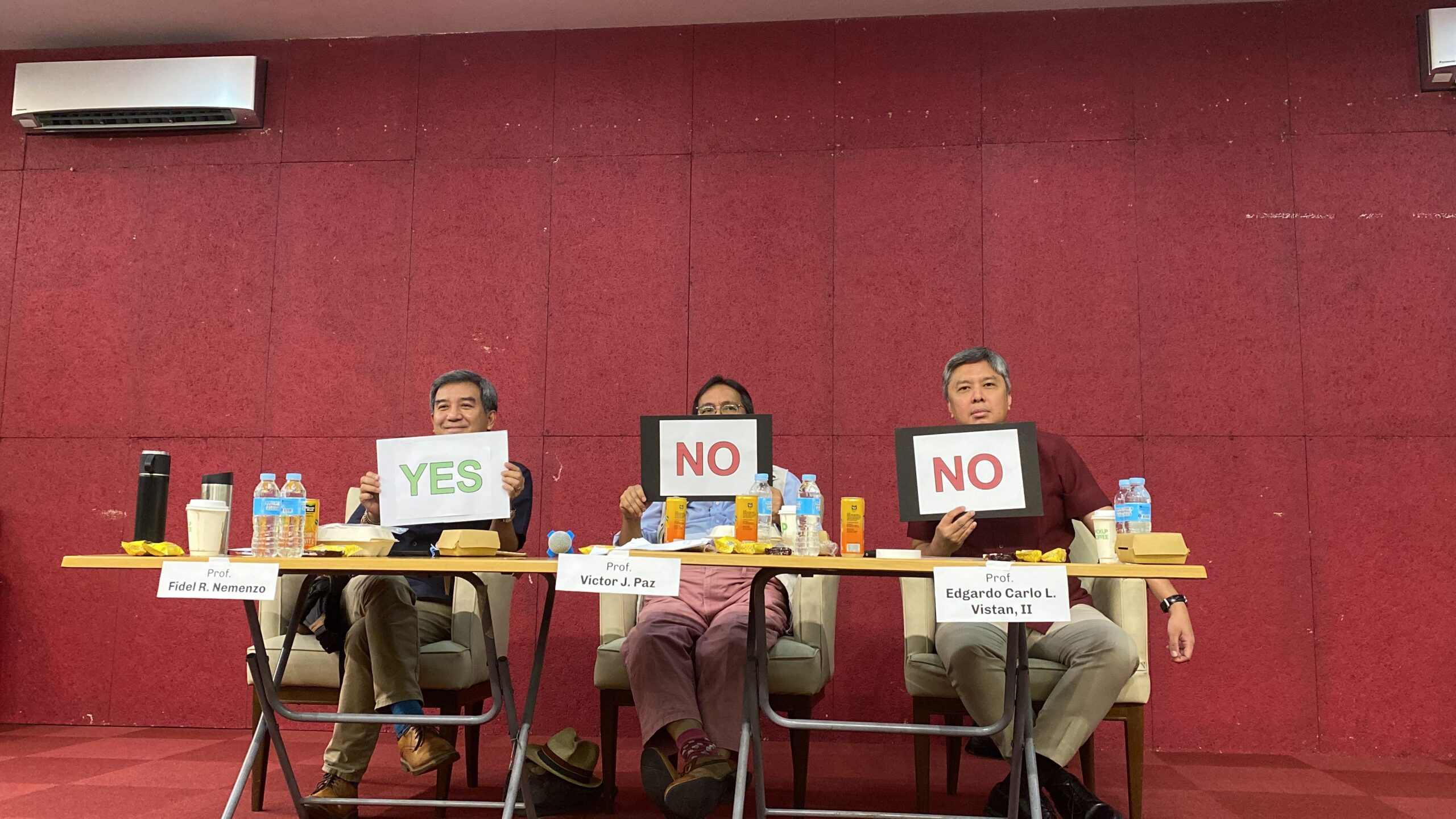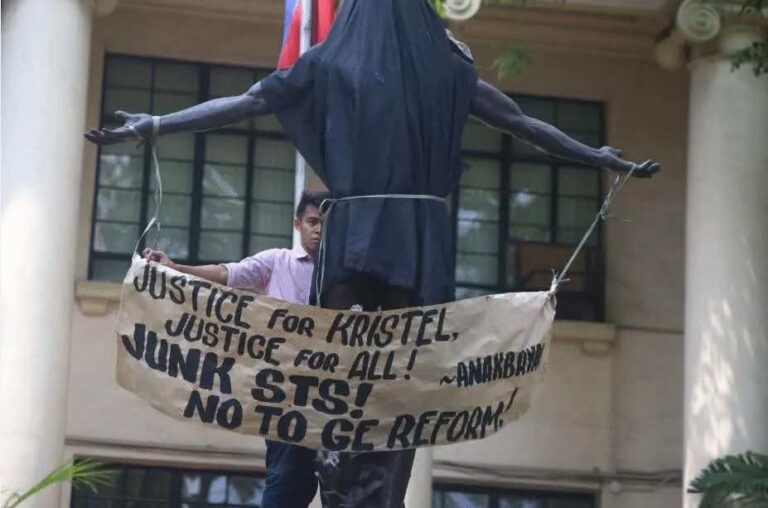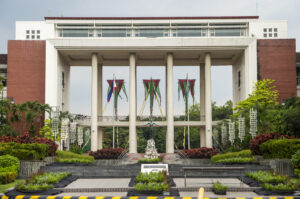
During KILATIS, a student-led forum on the 12th UP Diliman Chancellor selection held on March 26 2023 at the International Center for Public Administration, the nominees for the chancellorship faced the student body to talk about their stances on key issues. Where do these nominees stand, and how do they stack up with the student body’s stances?
Are you in favor of the reimposition of Mandatory ROTC?
Despite Marcos and Duterte allies in the legislature claiming that Mandatory ROTC will reinforce nationalist ideals and prepare students for national emergencies, student groups say that there is no use for it amidst an education crisis. Citing ROTC’s violent history and its focus on blind nationalism, numerous progressive organizations have registered their opposition to the bills being filed to reinstate it.
All three nominees answered NO to the reimposition of Mandatory ROTC. In the March 20 chancellor selection forum, the nominees expressed their opposition to mandatory ROTC as well.
Paz said that while UP had the manpower and facilities to implement ROTC, the same could not be said for all schools, and imposing it nationwide would open it up to problems of implementation. He also said that it is necessary to oppose ROTC as an avenue towards campus militarization.
Vistan likewise said that the state cannot pigeonhole students into infantry training and highlighting the need for students to have choices. “Nanggaling na tayo dyan eh. I don’t think it’s effective, whenever we have training for something like that, we need to give our students a choice,”
Lastly, Nemenzo made his opposition to Mandatory ROTC clear, saying that instead of making it mandatory and opening the door for even more militarization, the state should instead uphold the UP-DILG Agreement and institutionalize the UP-DND Agreement. “There are lines that you do not cross. That line is academic freedom,” Nemenzo said.
Should UP continue partnering with private entities?
To bolster funds, past administrators have partnered with private entities to lease UP assets, with UP-Ayala Technohub and UP Town Center being the prime examples. While this does bring in funds for other projects, this has also led to corporate interests trumping the interests of the students and the rest of the UP Community. When the administration allowed outsiders to fill the Gyud Food Market, for example, they set aside promises to UP’s small-time vendors that they would be given places in the new food hub.
READ: https://sinag.press/news/2023/01/24/maliliit-na-manininda-ng-up-initsapuwera-sa-bagong-food-hub/
Both Fidel Nemenzo and Victor Paz said YES, while Carlo Vistan said NO.
They were asked to clarify their stances on this question as well.
Nemenzo clarified that he did not see partnerships with private entities as inherently wrong. Instead, he said, it was more important to oppose the commercialization of education and the university’s agenda. “We have to make the most out of our assets while maintaining the public character of our facilities. The facilities of UP are not income-generating, they are primarily to meet the needs of education for our students and different sectors in UP.”
Paz agreed with Nemenzo, saying that what was important is to not let commercialization change the university’s public character.
Meanwhile, Vistan said that he answered no because he says that, while he is not completely against commercialization, he thinks that we have enough already. “Wala na tayong maibibigay pa.”�
Are you in favor of the establishment of PGH Diliman in Pook Arboretum?
All candidates said YES to the establishment of PGH Diliman, a hospital in Pook Arboretum, the last urban forest in Metro Manila. While the planned hospital will – ideally, at least – make healthcare more accessible, it will also displace the residents that call Pook Arboretum home. According to a report by Tinig ng Plaridel, about 600 families will be displaced by the planned hospital.
WATCH: https://www.facebook.com/tinigngplaridel/videos/379088194130759/
Salvacion Tuboro, a community leader of Pook Arboretum, asked them to expound on their stances and explain what they wanted to do about the residents to be displaced if the hospital pushes through.
Nemenzo said that it was vital to protect residents, but also said that it was necessary to build a public hospital in Quezon City. He said that the administration would continue to dialogue with the local government unit to find alternative housing arrangements and ensure that the residents are relocated on-site.
Paz, on the other hand, said that the administration cannot “simply give up,” the university’s land to the residents. “Kaya lahat ng nakatira sa UP, [kailangang] maunawaan natin na nandito lang tayo nang panandalian.” Paz supports relocation as well.
Lastly, Vistan suggests that the administration should consider including the budget for constructing relocation facilities in the overall UP-PGH construction budget. But, like Paz, he emphasized that residents should be aware that they cannot own the land they live on. He added that still, he wants them to be integrated in the overall UP community.
Are you in favor of junking the SIM Card Registration Law?
Amid growing concerns about the state’s attempt to undermine privacy and keep tabs on progressives, the SIM Card Registration Law has brought up questions about breaches in data protection and mass surveillance.
READ: https://twitter.com/PahayagangKAPP/status/1621777541790060545?s=20
Both Fidel Nemenzo and Victor Paz said YESto the bill’s junking, while Carlo Vistan said NO.
Are you in favor of reinstating the academic ease policies?
A week before the start of this academic year, the UP administration lifted the academic ease guidelines for the university, saying that the university had to transition back to the new normal. But with conditions far from the student version of Ligtas Na Balik Eskwela, many student groups continue to push for reinstating academic ease policies. They also say that bringing back academic easing is an important step in addressing the university’ growing mental health crisis.
Nemenzo said YES, while Paz and Vistan said NO.
Are you in favor of the contractualization of UP workers?
According to data from the Alliance of Contractual Employees in UP (ACE), by July 2022, there were already 2,153 contractual employees in the system. Under former UP President Danilo Concepcion, especially during the pandemic, these contractual workers bore the brunt of the workload to keep the university afloat while also being deprived of benefits, livable and stable wages, and security of tenure
While all candidates opposed contractualization, ACE released a statement on March 27 pointing out Dean Vistan’s statements on the issue in the previous selection forum. During the forum on March 20, as well as during Kilatis, Vistan emphasized the need to bring in more contractual faculty members to ease the workload for regular faculty. They also raised concerns about Vistan’s call to get UP out of the salary standardization law, which, they claim, will only lead to the administration depriving workers of even more wages.
“Sa halip na ipaglaban ang mas malaking budget para sa UP at mas maraming plantilla items ay pipiliin niyang isadlak pa sa hirap at dusa ang mas maraming guro at kawani bilang band-aid solution sa mga hamong kinakaharap ng Unibersidad,” they said.
Are you in favor of the resumption of the UPCAT in 2023?
During the Covid-19 pandemic that lasted over 3 years which resulted in immediate strict lockdowns and health protocols all over the country, universities responded to the ongoing health crisis through the temporary removal of entrance exams. Following this response, the UP system created a new admission model– the UPCA, which prioritized an applicant’s academic performance, as well as “economic and geographic equity”.
Two of the nominees, Carlo Vistan and Victor Paz said YES to the entrance examination resumption, while Fidel Nemenzo said NO, stating in the previous Chancellor selection forum that he believes the data given by grades function as more effective predictors of college performance, and incurs data that helps the University in the long run.
“I’m really in favor of reducing the percentage component of UPCAT in the UPG because there are other better predictors for your college performance than a test you just take for one day.” Nemenzo said.
Should we abolish the UPCAT?
Recent data about the UPCAT has put into question its role as the university’s admission process. Aside from the findings already mentioned by Nemenzo about how it is a bad predictor of college performance, a study by the UP School of Economics has also shown how UPCAT performance is heavily skewed in favor of those from higher socioeconomic statuses.
Paz and Vistan said NO, while Nemenzo answered YESto abolishing the UPCAT.
Are you for the abolition of the NTF-ELCAC?
Over recent years, the government has enabled a culture of impunity through the National Task Force to End Local Communist Armed Conflict (NTF-ELCAC) with the agency receiving a total of P6.3B for its funds under the General Appropriations Act of 2023. The University of the Philippines and its constituents have been regular targets of the task force.
With the heightened presence of state forces in the campus and the growing number of attacks on individuals and organizations, students say that the billions spent on the NTF-ELCAC should be spent on students instead.
READ: https://sinag.press/news/2021/12/21/no-new-year-for-fascists/
All three nominees answered YES to the NTF-ELCAC’s abolishment.
In the past, former chancellor Nemenzo has defended the university against the task force’s attacks with a sharp insistence on academic freedom and rejection of state intrusions into the campus. In 2021, when the League of Parents of the Philippines and Duterte Youth tried to stage a protest in the campus condemning UP’s “communist recruitment,” Nemenzo even stood alongside student organizations to face them.
As Law Dean, Vistan also wrote a letter to the Supreme Court demanding an investigation on the red-tagging of lawyers and judges.
Will you junk the Freshie Recruitment Ban?
Before the pandemic, freshmen were not allowed to join organizations upon entering the university, as the previous administrations implemented a ban on organizations recruiting freshman in their first semester. But while previous administrations claimed that this was merely to protect students, many organizations have said that this is a violation of their right to organize. They also pointed out that the ban was initially implemented when freshmen were 16, and now that most students that enter UP are already adults, banning freshman recruitment makes no sense.
All three nominees answered YES to junking the Freshie Recruitment Ban (FRB)
In its current state, do you think UP is a PWD-Friendly Institution?
Persons-with-disabilities (PWDs) in the University of the Philippines Diliman have lamented the lack of accessible facilities for decades. Although there have been measures taken to ensure accessible facilities such as the inclusion of ramps and elevators in the new Student Union Building, many disabled students have raised concerns about facilities where these changes have not been implemented, and a need to expand these efforts even further.
All three nominees said NO.
When asked about how they would make the university more PWD-friendly, the nominees agreed that a thorough audit of all university facilities was necessary.
Are you in favor of the full, free, and unconditional expansion of the Free Tuition Law
Currently, the Universal Access to Quality Tertiary Education act or RA 10931 has limits on who can avail of it: the program is only for undergraduate students, and even then, it has a limit on the number of years that a student can avail of the free tuition. Student groups have pointed out, however, that if education is a right, RA 10931 should have a much broader scope.
Nemenzo and Paz said NO, while Vistan said YES.
Nemenzo and Paz, however, clarified that they only said no because they were hesitant about agreeing to an “unconditional” set-up, citing operational problems. Vistan, meanwhile, said that he said yes because he knew that in real life, there would always be conditions.
Should we institutionalize the UP-DND Accord?
In 2021, during the term of former chancellor and current nominee Nemenzo, the Department of National Defense unilaterally terminated the agreement preventing state forces from entering the campus. Two years later, the bills filed in the legislature to insert the protections into the UP charter have still not been approved, and the university continues to be under threat.
All three nominees answered YES to institutionalizing the UP-DND Accord.
When the agreement was first terminated under Nemenzo, he immediately released a statement condemning the move, saying that there is “no justifiable reason” for the termination. Since then, Nemenzo has supported initiatives to institutionalize the accord, and has been consistent in saying that such protections are necessary.
Vistan, meanwhile, was part of the committee studying the measures filed to institutionalize the protections. In a previous answer, he said that it was important to revive similar legislative initiatives. He did, however, add that the Philippine National Police was the main problem and not the military, despite several documented military intrusions into different UP campuses.
Owing to these stances and his track record, the UP Diliman University Student Council endorsed former UP Diliman Chancellor Fidel Nemenzo in an emergency general assembly last night.








I’d like to find out more? I’d love to find out more details. http://www.hairstylesvip.com